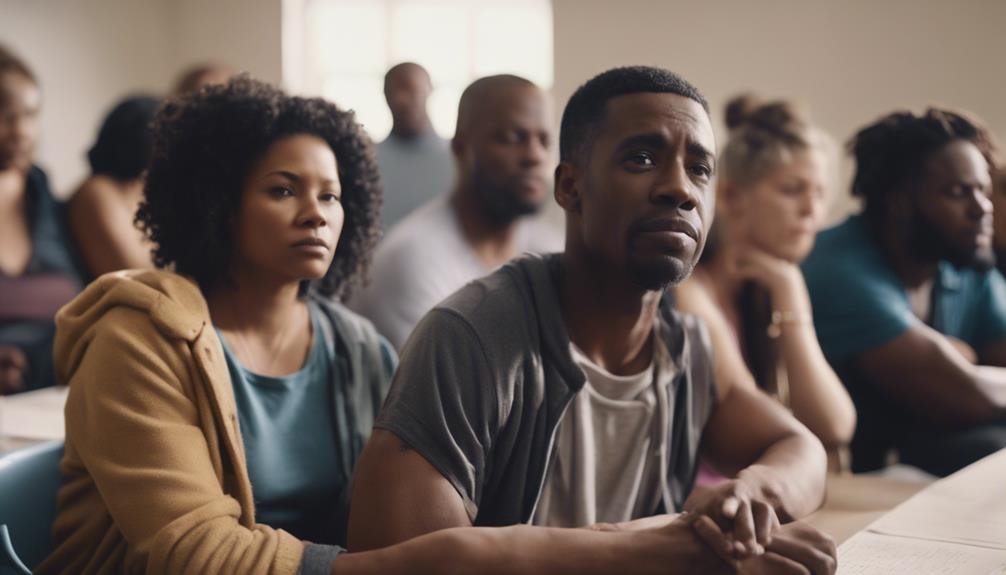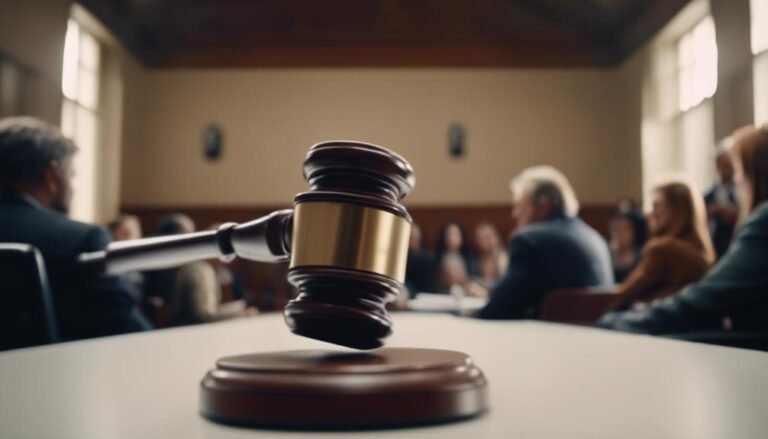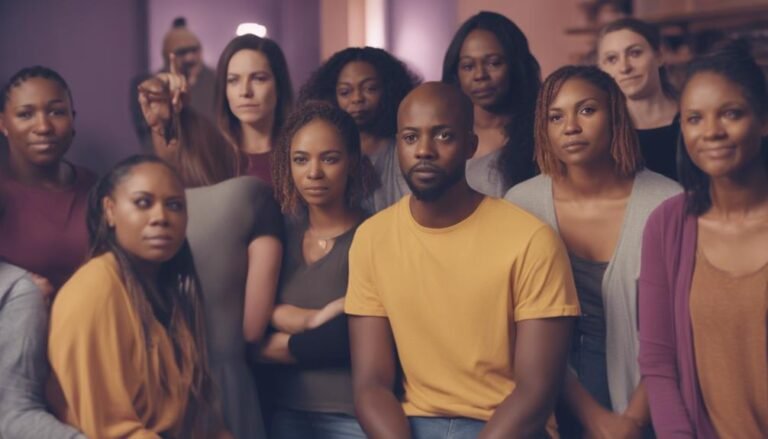Understand your legal rights in domestic violence to protect yourself and seek justice. Laws guarantee fair treatment, protection, and restitution for losses. You have rights during court proceedings like notifications, attendance, and consulting with a Government attorney. Being informed about protection orders is essential for your safety. Victim notification rights empower you throughout legal processes. Additionally, details on offenders’ convictions, sentencing, and release are important for your well-being and safety. Learning about financial support, legal representation, and victim witness assistance can further guide you through seeking justice effectively.
Key Takeaways
- Right to protection orders for safety.
- Entitlement to restitution for losses.
- Notification of court proceedings and outcomes.
- Consultation with a Government attorney.
- Access to victim witness assistance programs.
Legal Definitions and Protections
Understanding the legal definitions and protections surrounding domestic violence is essential for safeguarding the safety and well-being of victims. In Texas, domestic violence laws encompass various forms of abuse, including physical harm, threats, and offensive contact among family or household members. These laws aim to provide victims with the necessary legal recourse and protection against their abusers.
Victims of domestic violence in Texas are afforded specific rights under the law. Federal laws such as the Violence Against Women Act (VAWA) ensure fair treatment, protection from the accused, and restitution for victim losses.
Additionally, comprehending the criteria for qualifying domestic violence misdemeanors is vital, especially concerning firearm possession after a conviction.
Rights During Court Proceedings
During court proceedings, victims of domestic violence are entitled to specific rights and protections to safeguard their safety and well-being. You have the right to fair treatment, protection from the accused, and notifications about court proceedings under the law. It’s important that you feel supported throughout this process.
You can attend public court proceedings related to the offense and have the opportunity to confer with the Government attorney to make sure your voice is heard in legal proceedings. Additionally, you have the right to receive restitution for any losses incurred, such as medical care, housing, income loss, and legal fees. This is essential to help you recover and move forward.
Remember that information about the offender’s conviction, sentencing, and release is also your entitlement to keep you informed every step of the way. Seeking support from national hotlines and local assistance resources can help you navigate your legal rights and access the help you need.
Victim Notification Rights
You have the right to be notified about protection orders, receive assistance as a witness, and access information about court hearings as a victim of domestic violence.
These notifications aim to empower you during legal proceedings and guarantee your safety and well-being are prioritized.
Remember to reach out to support resources for guidance on exercising your victim notification rights.
Notification of Protection Orders
Receiving timely notification about protection orders issued in cases of domestic violence is an essential right for victims seeking safety and protection. This vital step guarantees that individuals are informed about the legal measures in place to shield them from harm.
Protection orders carry provisions that dictate the abuser’s behavior, including restrictions on contact and proximity, ultimately serving as a shield for the victim. By being notified of these orders, victims are empowered to take necessary precautions and reach out for assistance promptly if the order is breached.
Victim notification rights play a pivotal role in enhancing the safety and well-being of those enduring domestic violence situations. Remember, you have the right to be informed about the protection orders issued in your case, granting you the knowledge and agency to protect yourself from further harm.
Victim Witness Assistance
Guaranteeing victims of domestic violence receive necessary support and information is a fundamental aspect of victim witness assistance programs. As a victim of domestic violence, Federal law guarantees you certain rights to protect and assist you through the legal process.
These rights include being notified about court proceedings, the option to attend public court hearings, and the opportunity to consult with the prosecutor handling your case. Additionally, you have the right to seek restitution for any losses suffered due to the domestic violence incident, such as medical expenses or legal fees.
Federal law mandates that you’re kept informed about the offender’s conviction, sentencing, and release to ensure transparency and your safety. Remember, if you find yourself in this situation, there are resources available to support you, such as the National Domestic Violence Hotline and the National Coalition Against Domestic Violence.
You aren’t alone, and help is accessible.
Court Hearing Information
In cases of domestic violence, being informed about court hearings is an essential aspect of victim notification rights. As a survivor, understanding court hearing information is critical for your involvement in the legal proceedings.
Victim notification rights guarantee that you receive notifications about court dates, proceedings, and any changes in the legal process related to your case. By staying informed, you can actively participate in the legal process and assert your rights. These notifications empower you to stay engaged and seek justice for the harm you have experienced.
It’s important to be aware of the progress and developments in your domestic violence case, as this knowledge can help you navigate the legal system more effectively. Remember, you have the right to be kept informed throughout the court proceedings, and this information is essential for your well-being and pursuit of justice.
Attendance at Court Hearings
You have the right to attend court hearings related to the domestic violence offense you experienced.
By being present, you can guarantee your voice is heard, receive updates on the case, and provide valuable input.
It’s important to take advantage of this opportunity to participate actively in the legal process and seek the justice you deserve.
Court Hearing Procedures
When attending court hearings related to domestic violence cases, victims have the right to actively participate and provide input for their protection and well-being. It’s essential for victims of domestic violence to attend these hearings as they play a pivotal role in ensuring their safety and seeking justice.
The court is mandated to inform victims about upcoming hearings to facilitate their involvement in the legal process. During these hearings, victims can share their experiences, express their concerns, and request protection measures. This active participation not only empowers victims but also helps them understand the legal proceedings and assert their rights effectively.
Additionally, having victim advocates or support services present during court hearings can offer emotional support and guidance, making the process less intimidating. By taking an active role in court hearings, victims of domestic violence can advocate for themselves and work towards a resolution that prioritizes their well-being and safety.
Victim Support Options
Attending court hearings related to domestic violence cases offers victims essential opportunities for support and empowerment. As a victim, you have the right to attend these public proceedings and receive protection from the accused during the hearings.
One vital aspect of victim support options is the ability to confer with the Government attorney responsible for handling the case. This interaction can provide you with valuable information about the offender’s conviction, sentencing, and release, helping you navigate the legal process with more clarity and understanding.
Moreover, in cases of domestic violence, restitution may be mandated to address victim losses such as medical care and legal fees. This financial compensation can assist you in rebuilding your life after the trauma you have experienced.
Legal Representation Importance
Why is legal representation essential for individuals involved in domestic violence cases attending court hearings?
Legal representation plays a significant role in understanding the complexities of domestic violence cases. Attorneys specializing in such matters can provide invaluable guidance, protect your rights, and advocate on your behalf during court hearings.
By having legal representation by your side, you guarantee that your side of the story is effectively presented, increasing the chances of a fair outcome in your case. Lawyers can help you understand the legal implications of domestic violence charges, explain your rights, and guide you through the court proceedings.
Additionally, having an attorney present can assist in mitigating potential consequences like restraining orders, custody arrangements, and criminal penalties.
Ultimately, legal representation in domestic violence cases not only facilitates better communication with the court but also enhances your access to resources and improves the likelihood of a favorable resolution.
Consultation With Government Attorney

By seeking a consultation with a Government attorney, you can gain valuable insights and guidance regarding your domestic violence case. Government attorneys are there to assist you in understanding your legal rights, exploring available options, and maneuvering the complexities of the legal system.
Through this consultation, you can receive essential information about the prosecution process, your rights during court proceedings, and the potential outcomes of your case.
Consulting with a Government attorney empowers you to make informed decisions and seek justice effectively. These professionals are dedicated to supporting you throughout the legal process, offering guidance and assistance every step of the way.
Remember, you have the right to seek help and advice from Government attorneys to guarantee that your voice is heard and your rights are protected.
Don’t hesitate to reach out for a consultation with a Government attorney – they’re here to help you through this challenging time and advocate for your rights.
Restitution for Losses
In domestic violence cases, restitution for losses mandated by VAWA encompasses various expenses victims incur, such as medical care, housing, income loss, and legal fees. This restitution aims to assist victims in recovering from the financial impact of domestic violence offenses.
When seeking restitution, it’s important to keep detailed records of all expenses related to the crime. The amount of restitution that victims may receive is determined by the courts, considering the documented losses suffered. Additionally, in Gun Control Act cases associated with domestic violence offenses, restitution may also be required.
VAWA outlines these restitution provisions to provide support and aid to victims, recognizing the challenges they face in the aftermath of such traumatic events. By understanding and utilizing the restitution options available under VAWA, victims can take steps towards rebuilding their lives and moving forward from the harm caused by domestic violence.
Information on Offender’s Conviction
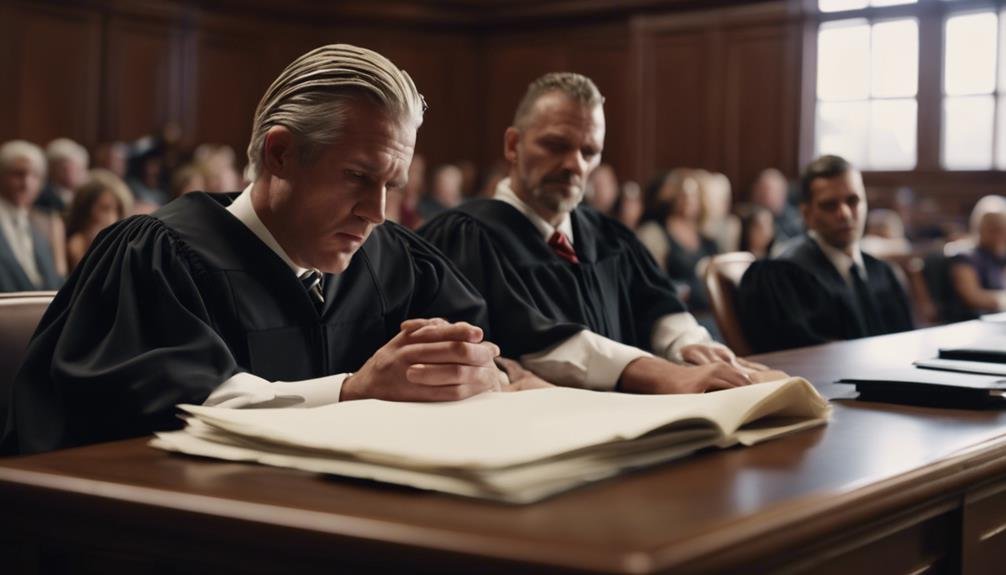
As a victim of domestic violence, it’s important for you to have access to information regarding the offender’s conviction to safeguard your safety and seek necessary support. Understanding the details of the offender’s conviction can help you make informed decisions about your well-being and seek assistance from resources like the National Domestic Violence Hotline and organizations supporting Victims of Crime.
By being aware of the offender’s conviction, you can take proactive steps to protect yourself and your loved ones. Knowing the legal consequences faced by the offender can empower you to make informed choices about your safety and seek appropriate legal recourse if needed.
The information on the offender’s conviction can also provide you with a sense of validation and support, knowing that the justice system has acknowledged the harm you have experienced.
Details on Sentencing and Release
Understanding the consequences of sentencing and release in domestic violence cases is essential for both offenders and victims in successfully maneuvering through the justice system.
Sentencing for domestic violence offenses varies depending on factors such as prior criminal history, the severity of the harm inflicted, and the use of weapons during the incident. It can range from probation and fines to imprisonment.
Upon release from prison, individuals may face parole conditions, such as attending counseling programs or maintaining a specific distance from the victim. It’s important to adhere to these conditions, as violating them could lead to re-incarceration or further legal consequences.
Both offenders and victims should familiarize themselves with the sentencing and release process to ensure justice is served and protection is maintained. By understanding these aspects, individuals involved in domestic violence cases can navigate the legal system more effectively, promoting accountability and safety for all parties.
Importance of Seeking Support
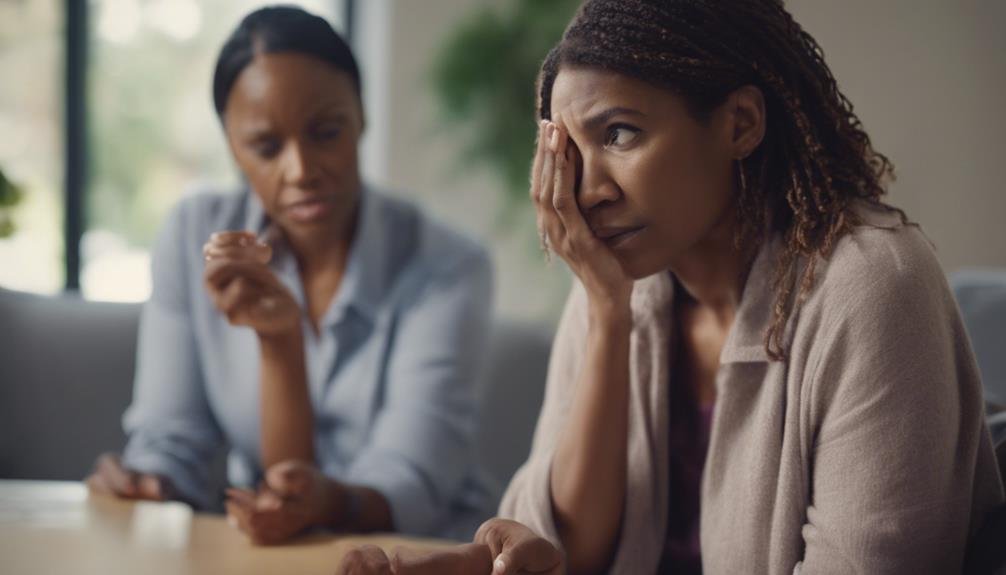
Seeking support is a crucial step for victims of domestic violence to ensure their safety and access to essential resources. As a victim, reaching out for help isn’t a sign of weakness but a powerful act of courage.
Organizations like the National Domestic Violence Hotline offer confidential assistance 24/7, ensuring you have a safe space to share your experiences and receive guidance. Remember, you have the right to fair treatment, protection, and notifications during court proceedings.
National resources such as the National Coalition Against Domestic Violence can provide further support and valuable information to assist you in maneuvering through this challenging time.
Additionally, consulting local law enforcement, the District Attorney’s Office, or victim assistance coordinators can help you understand your legal rights and explore available options. You deserve to be heard, supported, and empowered.
Frequently Asked Questions
What Are the Laws Against Domestic Violence in the Us?
In the US, laws against domestic violence include legal consequences for abusers, support resources for victims, and protection orders for safety. Knowing these laws can help you seek help and find justice.
What Does the Constitution Say About Domestic Violence?
The Constitution provides Constitutional Protections for victims of domestic violence, ensuring Legal Remedies and fair treatment. Support Services offer aid and guidance. Understanding these rights is crucial in managing legal challenges and seeking justice.
Conclusion
To sum up, remember that your legal rights in domestic violence are like a shield, protecting you from harm and ensuring that justice is served.
Seek support, know your rights, and don’t be afraid to speak up. Remember, you aren’t alone in this journey.
Your rights are there to guide you through the legal process and empower you to seek the justice you deserve. Stay strong and know that help is always available.

